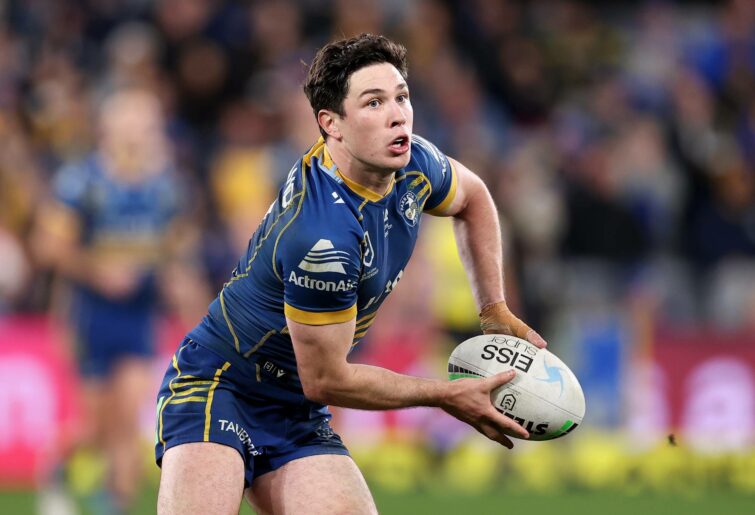Last week, just like so many other members of the rugby league family, my heart felt heavy with the news of the tragic and sudden passing of Paul Green.
I did not know him, but the news still weighs upon me. He was so young. He had a beautiful family. He had the respect and love of so many. He will always be remembered as a hero by the people of North Queensland for that glorious premiership in 2015.
Despite that, he still died by suicide. Since his death, there have been ample reminders of the importance of mental health.
We have been encouraged to continue to reach out to our mates, we have been reminded it ‘ain’t weak to speak’ and many have taken the opportunity to hug their loved ones a little bit closer and tell them how loved and valued they are.
It’s also clear there are many who want to do more.
Some have floated the idea of a ‘mental health round’ in the NRL. This would complement the work the NRL has been doing for years through its ‘State of Mind’ campaign which typically takes centre stage during State of Origin and promotes the fact that, just like an offload can change a game of rugby league, a conversation change a day or even a life when it comes to mental health.
In regard to a mental health round, I wonder whether this is enough and whether it will have the impact desired, particularly when you consider the broader context in which rugby league (and sport more generally) exists in.
Is more awareness the answer?
It’s not enough to talk about mental health when tragedy occurs. We need to be talking about it every single day and exhibiting behaviours which support positive mental health.
Just yesterday, Brisbane Broncos NRLW player Julia Robinson shared a photograph of herself on Instagram.
In that photo she is at training, wearing a Broncos singlet and biceps bulging. When I see an image like that, I think of a strong and confident woman who is being given the change to play the sport she loves at an elite level.
But not everyone saw it that way. Robinson shared some comments in response to this photo from social media – ‘he’s gonna be a good player’, ‘he’s a rig’ and ‘yuck, looks like a man trapped in a woman’s body’.
These are hurtful and harmful behaviours and demonstrate the underlying sexism which still exists in sport.
But Robinson is not the only player who has been targeted, whether on social media or elsewhere.
Earlier this year, some Parramatta Eels “fans” decided to boo Jake Arthur.
Mitchell Moses and his family received death threats from teenage boys.

(Photo by Cameron Spencer/Getty Images)
Ashley Klein has also received death threats following the controversial ending to the match between the Wests Tigers and the North Queensland Cowboys.
Last year, Josh Morris was threatened by a man online because he ‘ruined’ the fan’s multi.
Some may suggest these behaviours only happen in the minority. Irrespective of that, this behaviour does not promote or support positive mental health.
What other bigger system pieces are at play that may also contribute?
Australians love a punt. I have absolutely no problem with people who decide to punt. But what is the impact of the prevalence of gambling advertising in the media we consume pre-game, during and post-game or on jerseys and in naming rights of stadiums?
Whichever way you spin it, gambling can lead to financial hardship, and no doubt leads some people to act out, targeting players with abuse on social media.
Then there’s the media itself and the scrutiny that people in the rugby league family are subjected to.
The pressure we place on referees when the media decide after every weekend that there was at least one controversial call which ‘cost’ a team a game.
The politics in the media where a coach can call a player a ‘weak-gutted dog’ (problematic in itself) and then still be defended, players criticised for the honouring of their heritage through choice of team and even the criticisms faced by players when standing up for their beliefs, whether it be a decision not to sing the National Anthem or speaking out following racist abuse.
We cannot have our cake and eat it too. A ‘mental health’ round means nothing if we don’t push ourselves to be better and push our game to be better too.
We all have a role to play here in being kinder to each other.
As fans, we absolutely decide how we interact with other members of the rugby league family – we choose our words and our behaviour.

(Photo by Jono Searle/Getty Images)
But we have far more influence than that. We decide what the media writes with our clicks. If you are tired of toxic coverage or concerned about the mental health and wellbeing of our athletes, coaches, administrators and officials, stop clicking.
The death of Paul Green was an absolute tragedy. As a game, I do not want to have to see another team or family lose someone they care deeply about.
But equally as important is ensuring we as a game and a fan base are contributing to an environment where our players can have positive mental health.
The Roar encourages all readers who may be suffering from mental illness to seek support from organisations such as Lifeline, Beyond Blue, and Headspace.






























































































